
Table of Contents
Today, you may not find many job posts for the title of “SaaS Manager” or “SaaS Application Manager.” But future prospects for the role are becoming increasingly clear. At Zylo, we believe you will soon see jobs with the title SaaS Manager from tech-forward organizations as their cloud and SaaS investments continue to grow.
The adoption of SaaS shows no signs of slowing and more organizations now recognize the unique complexity of SaaS-related challenges and the need for specific job functions that can address them. In this post, we’ll explore what the job description for the role of a SaaS manager might look like and how this role will make SaaS-reliant organizations’ software portfolios more effective.
What Is the Role of a SaaS Manager?
A SaaS manager is an individual who manages the lifecycles for all of an organization’s subscription-based software. That includes identifying and tracking all subscriptions, optimizing usage and costs, ensuring security and regulatory compliance, and collaborating with key stakeholders across the business. In this role, the SaaS manager is responsible for helping the organization maximize its software investments while mitigating financial, security, and operational risks.
SaaS managers are commonly part of the IT team, though may also be part of the Software Asset Management (SAM) and/or Procurement teams. While it can be a dedicated role, the responsibilities may also be dispersed among several other roles within the business. Those roles may be familiar to you already, such as:
- SaaS Operations Management (SaaSOps)
- SaaS Spend Management
- IT Sourcing or Procurement
- Software Asset Management
- Application Portfolio Management
- Enterprise Architecture
- FinOps
- Digital Workplace Experience
The No-BS SaaS Management Playbook
Learn MoreWhy Do You Need a SaaS Manager?
SaaS has introduced unique challenges to the business that are not present with on-premises software, creating the need for a dedicated SaaS manager.
SaaS Has Changed the Way Software Is Bought
SaaS has changed how enterprises acquire and use software, and SaaS use continues to grow. Gartner predicts that total SaaS spending will grow 19.4% from $247B in 2024 to $295B in 2025, underscoring that more organizations will keep buying and using SaaS products. SaaS is also the largest segment of the cloud-based software market, a trend that’s expected to continue.
In addition, everyone within a company is now a buyer—department heads, lines of business, individual employees—not just IT leaders or sourcing teams. In fact, Zylo data shows that 84% of all software applications are purchased outside of the IT team’s purview.
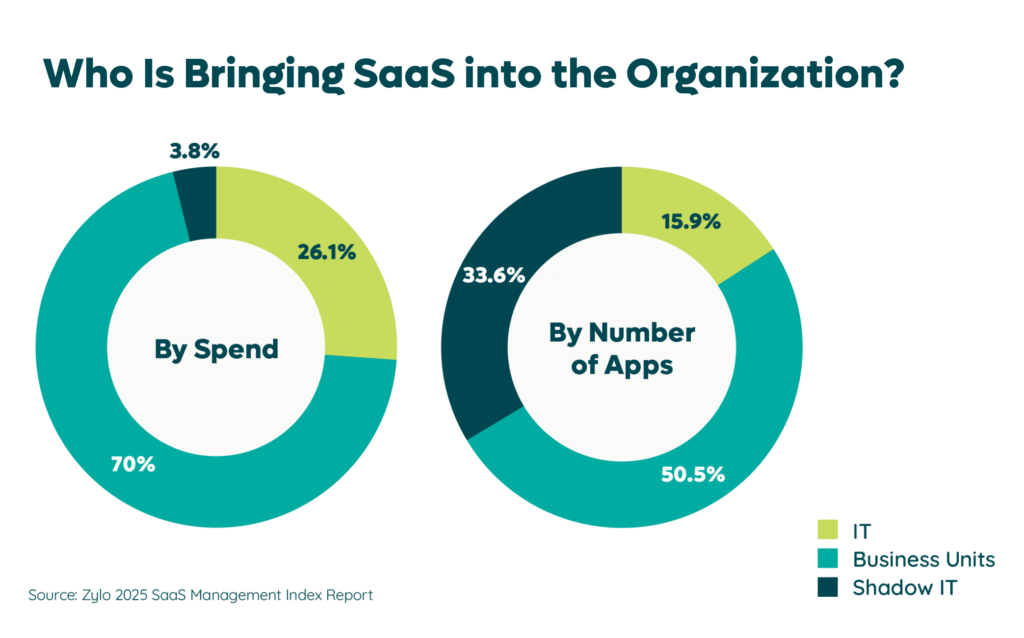
The decentralization and democratization of enterprise software purchasing create unique questions and challenges:
- What is the enterprise’s total SaaS investment?
- Which cost center(s) owns the investment?
- Is the software compliant with the org’s best practices for security and privacy?
- Are the applications being used effectively?
- When exactly do these applications renew their service agreements and under what terms?
Without a SaaS manager who has visibility into your entire inventory, many of these questions will go unanswered.
Larger Portfolios Make It Difficult to Scale Software Management
When on-prem was the only type of software available, companies managed a smaller portfolio. But then SaaS opened the door to decentralized purchasing. Now, the growing appetite for SaaS from businesses and individuals alike has caused the average portfolio to balloon. According to our annual report, the average organization has 275 applications and spends $49M annually on SaaS.
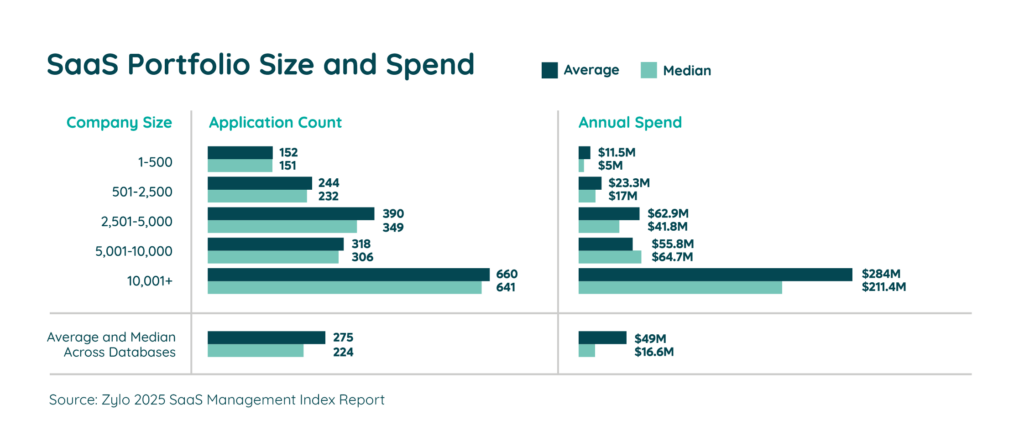
With IT-owned applications accounting for just 16% of the portfolio, that means there are hundreds of applications unmanaged. That leaves room for overspending, duplicate subscriptions, unvetted security risks, license waste, and more.
How can you bring those business-owned applications into the fold?
It starts by discovering every application in your business—even shadow IT applications. SaaS managers must establish processes and use the right tooling to automate and scale inventory, license, and renewal management practices across the entire portfolio of apps.
Existing Software Asset Management (SAM) Tools and Processes are Inefficient for Managing SaaS
Because SaaS is distributed, IT and SAM teams have limited visibility into their full software inventory. As a result, they often underestimate how much they are spending and the size of their portfolio. It becomes challenging to get complete visibility—and thus effectively manage apps—due to outdated tools and processes.
Incorporating SaaS for Holistic Software Management
Software Asset Management professionals have commonly managed software to safeguard against license over-deployment and track end-user utilization. In an on-premises environment, their focus has typically been on IT-purchased, with an emphasis on the centrally managed provisioning of licenses and users.
Now, with 60% of total software spending consisting of SaaS, according to IDC, SAM pros need to take a more holistic approach to managing software. But therein lies the challenge. The existing job description for on-premises managers may not match the job description required for addressing the unique challenges of SaaS.
IT and SAM teams must adopt new strategies and processes to holistically manage software and its associated spending and risks.
Using a SaaS Management Platform to Augment Traditional SAM Tools
Enterprise SAM practitioners may also find that their current toolset is ill-equipped to manage SaaS, making it difficult to answer the aforementioned questions. Often, teams use multiple spreadsheets or traditional SAM tools – neither of which holistically address the problem or provide scalable solutions.
SaaS can appear in multiple discrete instances across an organization, not under a centrally managed system. To survive in an increasingly cloud-forward world, enterprises must discover, inventory, and actively monitor and optimize subscription-based software with a SaaS Management Platform. By pairing an SMP with a SAM tool, SaaS managers can holistically manage software.
Watch the short video below to learn from Jason Owens, former Sr. Director of Asset Management at Salesforce, why companies need both tools.
What Do SaaS Managers and Their Teams Do?
SaaS managers and their teams have a broad range of responsibilities.
Assist the Organization in Selecting SaaS Applications
While anyone in the organization can purchase SaaS, SaaS managers are a valuable resource to help with the selection process. By sharing knowledge of what apps already exist within the business, they can help teams find the right solution. If there’s not an existing tool, SaaS managers use their SaaS expertise to help vet new tools.
Establish and Maintain a SaaS System of Record
A SaaS system of record is essential for managing your applications, but it is only as good as the data you put in it. As part of the software lifecycle, SaaS managers ensure all applications get onboarded into a system of record and it is regularly maintained. It should include information about the application, such as license utilization, renewal dates, app owners, business criticality, and cost center—among others.
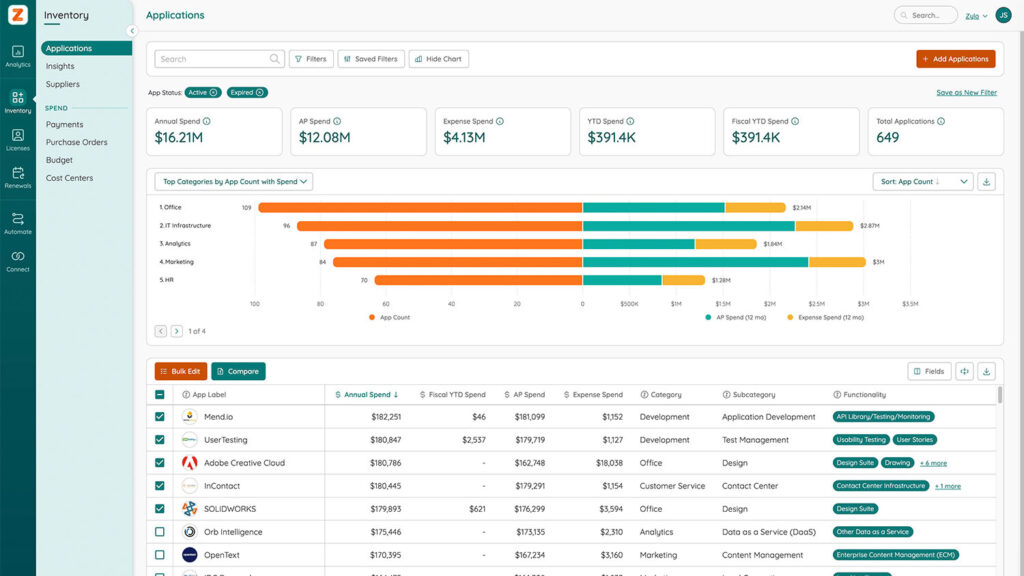
Manage Software Lifecycles
SaaS managers are responsible for the lifecycle of a SaaS application, from onboarding it into the system of record to deprecation. It includes establishing processes for how a software title will be managed, creating a renewal calendar, and supporting renewal decisions with application and/or business owners.
Optimize License Agreements
Licensing models differ from application to application, making it challenging to optimize your license agreements. A savvy SaaS manager stays educated on the licensing models and best practices for monitoring usage. They should regularly track usage and license positioning and take action on opportunities to downgrade or reclaim unused licenses on an ongoing basis.
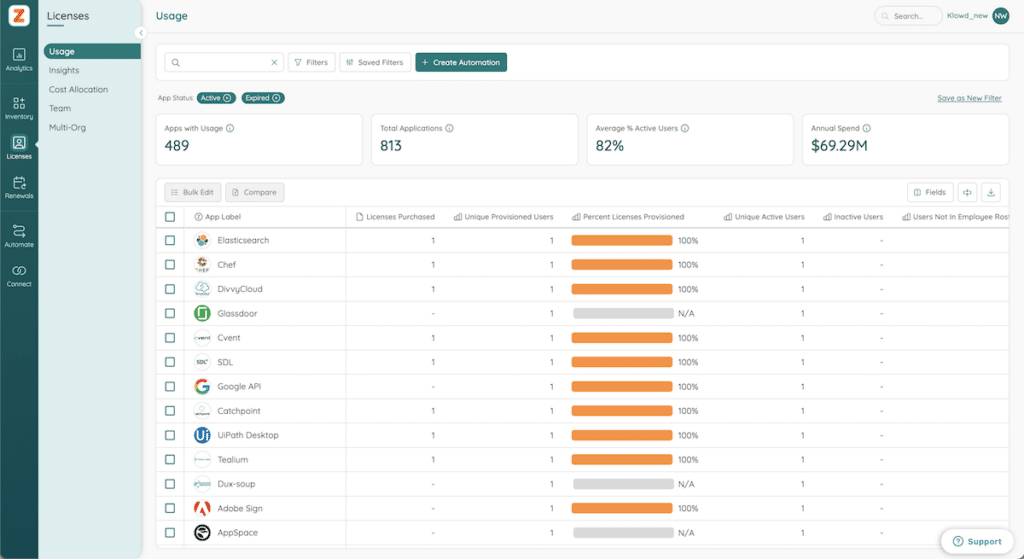
Collaborate with Key Stakeholders and Business Units
SaaS Management is a team sport; it cannot be done in a silo. SaaS managers must collaborate with key stakeholders across IT, SAM, and Procurement—as well as business units. While each group has different responsibilities, together they ensure that the organization’s SaaS portfolio delivers maximum value, aligns with strategic goals, and avoids unnecessary spending.
Forecast and Track SaaS Budgets
By having all spending data centralized in a system of record, SaaS managers can easily understand what is being spent, how software is being purchased, and who is purchasing it. Insight into cost centers helps IT better allocate costs for shared software across the business, while usage data can help teams budget more accurately for their needs.
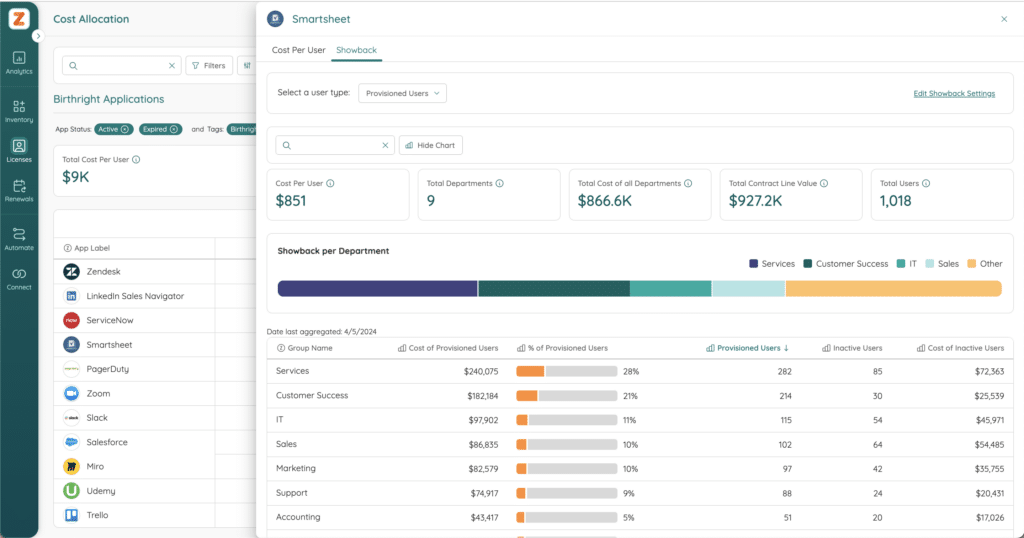
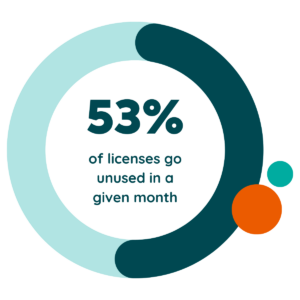
Drive Efficient Use of Tools
License waste and redundancy plague many software portfolios today. Our data shows that 53% of licenses are unused in a given month. It’s incumbent upon the SaaS manager to identify opportunities to remove waste and improve efficiency. SaaS managers should regularly monitor and optimize usage, and identify where redundant applications can be removed.
How Should IT, SAM, and Procurement Work Together?
Clear roles and responsibilities are critical if you want your SaaS Management program to be successful. Without that clarity, critical tasks may fall through the cracks and accountability becomes difficult to enforce.
SaaS Management Roles and Responsibilities
If your organization is larger, your SaaS manager role may be broken down into separate roles across IT, Software Asset Management, and Procurement. What are they each responsible for?
- IT often defines the SaaS Management strategy, focused on operational efficiency, security and risk mitigation, innovation, and employee experience.
- Software Asset Management plays a supporting role to IT and Procurement, focused on license compliance and cost savings.
- Procurement is responsible for SaaS purchasing, contracts, and renewals, bringing an objective perspective to financial decisions.
Maintaining Cross-Functional Collaboration
By collaborating cross functionally with key stakeholders, it keeps data top of mind. That way, it is in front of the right people to keep them informed and help them make decisions. Below are common examples of how IT, SAM, and Procurement collaborate on SaaS Management.
- Driving SaaS renewal decisions
- Optimizing costs, eliminating waste, and driving value
- Strengthening your security posture
- Implementing SaaS governance
Job Description for SaaS Managers: Roles & Responsibilities
When SaaS managers become more commonplace, a sample job description of roles and responsibilities might include:
- Collaborate with IT, sourcing, and business stakeholders to identify and document all SaaS applications and subscriptions throughout the organization.
- Create an ongoing transparent and continuously updated inventory of SaaS instances accessible to department heads and cost center owners.
- Create documentation around evaluation, integration and governance within IT best practices for application adoption, license provisioning, security, privacy, and user on- and off-boarding.
- Determine KPI measurements for SaaS application adoption, usage and sentiment, and deliver reporting to stakeholders across the organization.
- Evaluate and monitor SaaS application inventory across the organization for optimal cost effectiveness, including the elimination of application or cost center redundancy.
- Manage SaaS application life cycles including the creation of a SaaS renewal calendar; build a documented, collaborative evaluation process; and develop action plans for upcoming renewal dates.
- Develop ongoing partnerships with IT, sourcing, vendor management and individual department managers to lead digital transformation and increase organizational ROI, effectiveness, and agility.
- Help stakeholders find the most effective tools to increase business effectiveness, including Marketing, Human Resources, Finance, and IT.
- Lead teams to independently evaluate their best practices and adopt a value-driven mindset when purchasing new SaaS applications.
- Optimize licensing agreements with a focus towards leveraging enterprise license agreements (ELAs).
6 Must-Haves to Be a Successful SaaS Manager
Want to be a successful SaaS manager? Here is the fundamental knowledge and experience you should have.
- A strong understanding of the Software as a Service landscape, including emerging technologies (think: AI), vendor pricing, licensing models, etc.
- Proven experience in managing IT budgets and cost optimization strategies
- Excellent analytical and data storytelling skills to identify trends, make informed decisions, and report outcomes to executive leadership
- Strong communication and collaboration skills to work cross-functionally with IT, SAM, Procurement, and business leaders
- Understanding of IT security best practices, compliance regulations, and governance strategies
- Project management skills to oversee SaaS onboarding, ongoing management, and contract renewals
Become a SaaS Management Superhero
Learn MoreWho Already Tackles Enterprise SaaS Management Today?
Portions of the above SaaS manager job description likely sound familiar to enterprise technology leaders or sourcing teams. For many organizations, it’s likely that multiple professionals or teams fulfill some or all duties listed above, including CIOs, enterprise technology architects, ITAM professionals, and vendor management or sourcing teams.
From our nearly decade of experience working with customers, our data shows that companies underestimate their SaaS spending by 304%. The average enterprise also experienced at least two SaaS application renewals per business day.
Comparing these stats against the billions that Gartner has projected companies will invest in SaaS, now is the time to contain costs and improve the value of your software investments.
There’s little doubt that investment in SaaS will only increase. But how will enterprise technology leaders proactively answer the challenges that accompany this unyielding trend?
For leaders focused on making good use of software investments, rightsizing application use, and creating best practices for governance, now is the time to consider developing a SaaS application management specialist role. Use this SaaS manager job description as a starting point for finding the team to help achieve these goals.
Get a glimpse into the life of a SaaS Manager by hearing directly from these leaders already taking this role head on.


Collaborate with These Stakeholders for SaaS Management Success
Table of Contents ToggleCIOProcurement/SourcingFinanceLegalBusiness Unit LeadersITEnsure Collaboration Among Key Stakeholders for...

What Does an Application Portfolio Manager Do?
Table of Contents ToggleWhat Is an Application Portfolio Manager?The Unique Challenge...

5 Things FinOps Pros Need to Know about SaaS Management
Table of Contents ToggleSaaS Has Changed the Way Software Is BoughtLarger...


